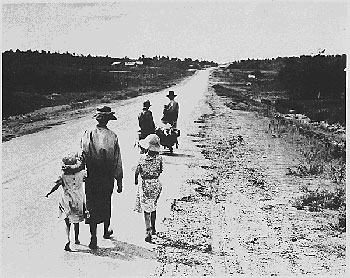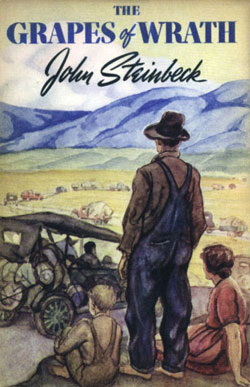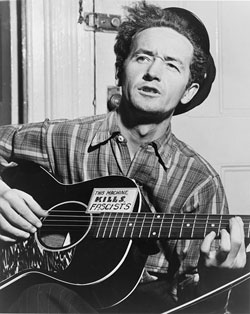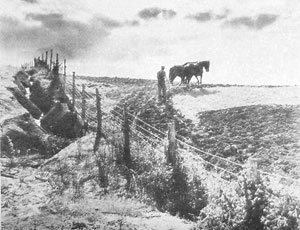
Source: (Picture from the Franklin D. Roosevelt Library, courtesy of the National
Archives and Records Administration.)
Farm Security Administration: Homeless family, tenant farmers in 1936.
John Steinbeck
“If it’s true that adversity and hardship can bring out creativity,” said Miles Orvell, professor of English and American studies at Temple University, “then the Great Depression was one of the great creative periods of our time.” One avenue for this burst of creativity was writing. Certain themes pervade literature from the Great Depression: despair, corruption, poverty, fighting between labor and management, and the need to put hardships aside and work together. Below are examples of Depression-era literature by author John Steinbeck and songwriter Woody Guthrie. As you read these excerpts, pay close attention to the tone of each. Steinbeck and Guthrie use diction in these pieces to reveal their attitudes.
Steinbeck and Guthrie targeted similar audiences. Both writers hoped to tell as many people as possible about the hardships ordinary Americans were facing at the time. Their purposes were also focused on the message that many people were suffering. In terms of formality, Steinbeck and Guthrie chose to use the vernacular of the working class to make their points. Some people thought that this type of language was too coarse or informal, but using the language of real voices made Steinbeck and Guthrie’s works more authentic.

Source: The Grapes of Wrath by John Steinbeck, first edition cover
In the following excerpt from The Grapes of Wrath (1939), Steinbeck uses certain words and phrases to indicate the tone. He tells a grim story about how landowners, storekeepers, bankers, and laborers hated the sharecroppers from Oklahoma. The “Okies,” as they were known, fanned out across the country looking for work during the Great Depression. Steinbeck’s words and phrases create a tone of desperation and sadness. His purpose is to convey that these transients were so poor and desperate that they had reached the point of breaking the law. He portrays how much the Okies suffered in their quest to feed their families. As you read the passage below, click on the words or phrases that indicate the tone of the piece. If you choose correctly, the word or phrase will highlight. Choose at least 15 words or phrases.
John Steinbeck: The Grapes of Wrath, Chapter 19:
They were hungry, and they were fierce. And they had hoped to find a home, and they found only hatred. Okies—the owners hated them because the owners knew they were soft and the Okies strong, that they were fed and the Okies hungry; and perhaps the owners had heard from their grandfathers how easy it is to steal land from a soft man if you are fierce and hungry and armed. The owners hated them. And in the towns, the storekeepers hated them because they had no money to spend. There is no shorter path to a storekeeper’s contempt, and all his admirations are exactly the opposite. The town men, little bankers, hated Okies because there was nothing to gain from them. They had nothing. And the laboring people hated Okies because a hungry man must work, and if he must work, if he has to work, the wage payer automatically gives him less for his work; and then no one can get more. . . .
Talking in the camps, and the deputies . . . men with guns slung on fat hips, swaggering through the camps: Give ’em somepin to think about. Got to keep ‘em in line . . . If they ever get together there ain’t nothin’ that’ll stop ’em. . . .
In Lawrenceville a deputy sheriff evicted a squatter, and the squatter resisted, making it necessary for the officer to use force, the eleven-year-old son of the squatter shot and killed the deputy with a .22 rifle.
Rattlesnakes! Don’t take chances with ’em, an‘ if they argue, shoot first. If a kid’ll kill a cop, what’ll the men do? Thing is, get tougher’n they are. Treat ’em rough. Scare ’em.
What if they won’t scare? What if they stand up and take it and shoot back? These men were armed when they were children. A gun is an extension of themselves. What if they won’t scare? What if some time an army of them marches on the land as the Lombards did in Italy, as the Germans did on Gaul and Turks did on Byzantium? They were land-hungry, ill-armed hordes too, and the legions could not stop them. Slaughter and terror did not stop them. How can you frighten a man whose hunger is not only in his own cramped stomach but in the wretched bellies of his children? You can’t scare him—he has known a feat beyond every other.
- How many times is “hungry” or “hunger” used in this excerpt?
- How many times is “hate,” “hatred,” or “hated” used in this excerpt?
- Which word best describes the tone used in the writing?
Woody Guthrie
When Woody Guthrie wrote the ballad “I Ain’t Got No Home” in 1940, the nation had already been through a decade of the Great Depression. Guthrie had been traveling around the country by rail and living among migrant workers and drifters. On his visits to the migrant camps in the autumn of 1938, Guthrie found that one of the more popular songs was a hymn titled ”I Can't Feel at Home in This World Anymore," made popular by the Carter Family. The song focuses on heaven and the hereafter, a final relief for those suffering during the Depression. Perhaps in response, Guthrie wrote his own song with the migrant workers in mind. His tune is called "I Ain't Got No Home in This World Anymore"—a parody of the Carter Family hymn.
Consider the diction, tone, and formality of the song. Guthrie uses the working man’s informal vernacular to show his familiarity with his audience and their troubles. His purpose is twofold: to entertain through music and to educate his audience about the troubles he has seen.
Even though Guthrie’s lyrics are not quite as harsh in tone as the passage from The Grapes of Wrath, the ballad appeals to a similar audience and has a similar purpose. As you read a stanza from the lyrics, click to highlight the four words or phrases that you think indicate tone. When you finish, listen to the entire song by clicking on the song title.

Source: New York World-Telegram and the Sun staff photographer: Al Aumuller (donated to the Library of Congress in 1968)
I Ain’t Got No Home
(2nd stanza)
My brothers and my sisters are stranded on this road,
A hot and dusty road that a million feet have trod;
Rich man took my home and drove me from my door
And I ain’t got no home in this world anymore.
Did you notice a change in tone? Keep in mind the reason Guthrie wrote this song. Now read and answer the questions that follow. You may download the song lyrics to help you answer the questions.

Source: “Tennessee Valley Farmer, 1930s.” Wikimedia Commons
- What is the tone of the first three stanzas?
- What is the tone of the last stanza?
- What is Guthrie’s message in the last stanza?